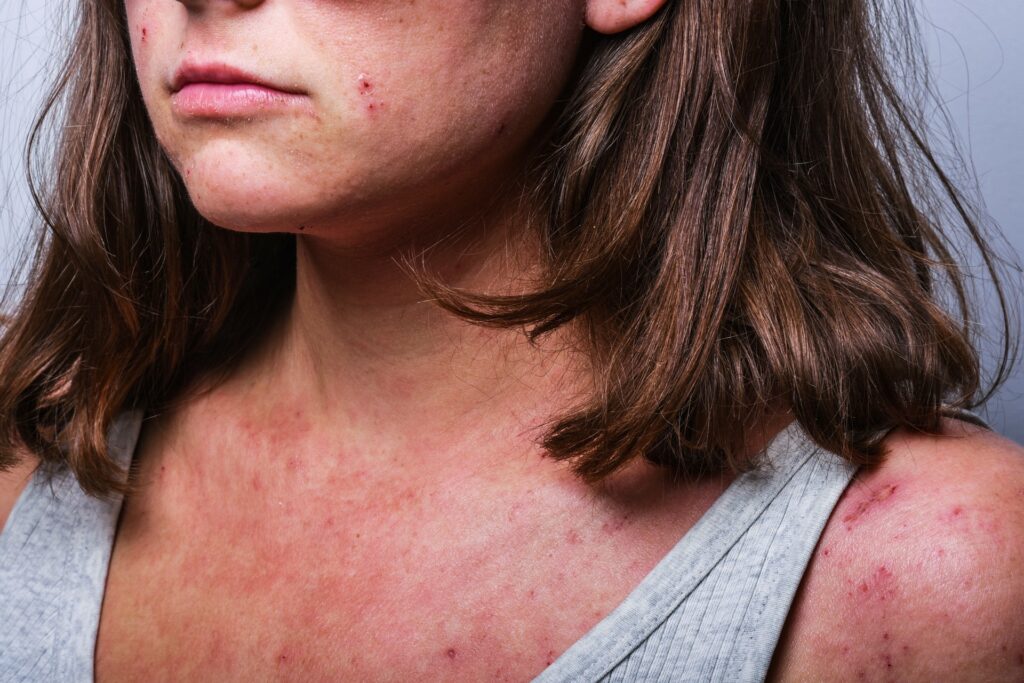Is Skin Health Related to Mental Health?

Mental health is not always accompanied by physical signs like diabetes and high blood pressure. However, severe skin conditions may not be evident because those suffering have mastered covering up or avoiding situations altogether. These efforts can take an emotional toll. The social impact of severe skin conditions can be debilitating and lead to depression and isolation. Many people suffer from skin conditions and cover them up or are forced to expose their skin to the world. Some of the most common skin conditions that may have a negative mental impact are psoriasis, eczema, and acne. These skin health conditions have been tied to anxiety, depression, and low quality of life.
If you suffer from a skin condition that you believe is affecting your mental health or limiting your ability to live your best life, please do not hesitate to contact a caring and licensed dermatologist who can help diagnose and treat your condition.
Severe and Untreated Psoriasis Can Negatively Affect Mental Health
Psoriasis is an inflammatory skin condition that reveals itself through flaky, itchy, scaly skin that can be unpleasant to look at. Psoriasis is also connected to symptoms of arthritis. When not treated, Psoriasis can cause those suffering from it to feel embarrassed, depressed, and helpless. However, psoriasis is treatable and can be appropriately diagnosed by an experienced dermatologist, and clients can get relief through effective topical and oral treatments. Feelings of depression and anxiety directly affect sleep, which disrupts the body’s ability to heal and get much-needed rest. More than 80% of patients with psoriasis report it negatively affecting their lives.
Untreated Eczema Can Make Life More Difficult
Eczema causes the skin to feel extremely tight and dry, which makes the skin red and itchy. Eczema disrupts sleep for those suffering from the condition, and sleep affects other areas of life. Extended periods with little or disrupted sleep patterns can cause low self-confidence, self-esteem, and physical health. Those with eczema often complain they do not feel comfortable in their own skin.
The mental toll eczema takes after several weeks snowballs into stress. Stress starts a cycle of physical symptoms, causing more stress to one’s mental health, which, in turn, causes more stress and worsens skin conditions. The vicious cycle of mental to physical and back to mental can be hard to break without the professional help of a licensed and well-regarded dermatologist. Once a patient is experiencing mental symptoms from extended suffering from their skin condition, it is critical to see someone with the skill and experience to correctly diagnose your condition for the first time and offer affordable and effective treatments.
Acne Affects Teens’ Mental Health
Severe acne can be treated! Seeking professional help from a licensed dermatologist is essential for teens as they struggle with hormonal changes and rigid social structures driven by the latest media trends. Teens’ mental health can quickly be adversely affected by severe acne, and that is why it is essential to find a qualified and experienced acne dermatologist who can offer a diagnosis and treatment. Even if your child is not asking for it, do them a favor and make them an appointment. Teens are under unimaginable stress simply by being a teenager in today’s world. Adding anything to that, like severe acne, can make life much more complicated than it needs to be at school, work, and socially. Teens who suffer from extreme skin conditions that cause them to cover up and avoid social settings report feelings of depression, anxiety, and loneliness.
Teens who seek professional help from a dermatologist to treat their acne experience improved quality of life and mental health. Dealing with acne as a teen is no joke, and parents should seek professional help if their child is suffering from severe acne.
Supporting Those with Chronic Skin Conditions
One of the most important things we can do to help minimize the negative mental impact of a chronic skin condition is to support those who are suffering and encourage them to seek professional help. Many people with psoriasis and eczema may cover up to avoid confusion about their condition being contagious. Feeling isolated can take a terrible emotional toll. If you or someone you know is affected by one of these skin conditions and has been dealing with it for more than a couple of weeks, please seek help. Chronic skin conditions will limit activity and sleep, negatively affecting mental health. Please do not hesitate and reach out to a reputable dermatologist close to you. There are always options for affordable treatment, and it can change your life for the better.
If you live or work in Atlanta, Buckhead Dermatology has decades of experience helping clients overcome chronic skin conditions of psoriasis, eczema, and acne. Call today for an appointment and find the relief you deserve.
